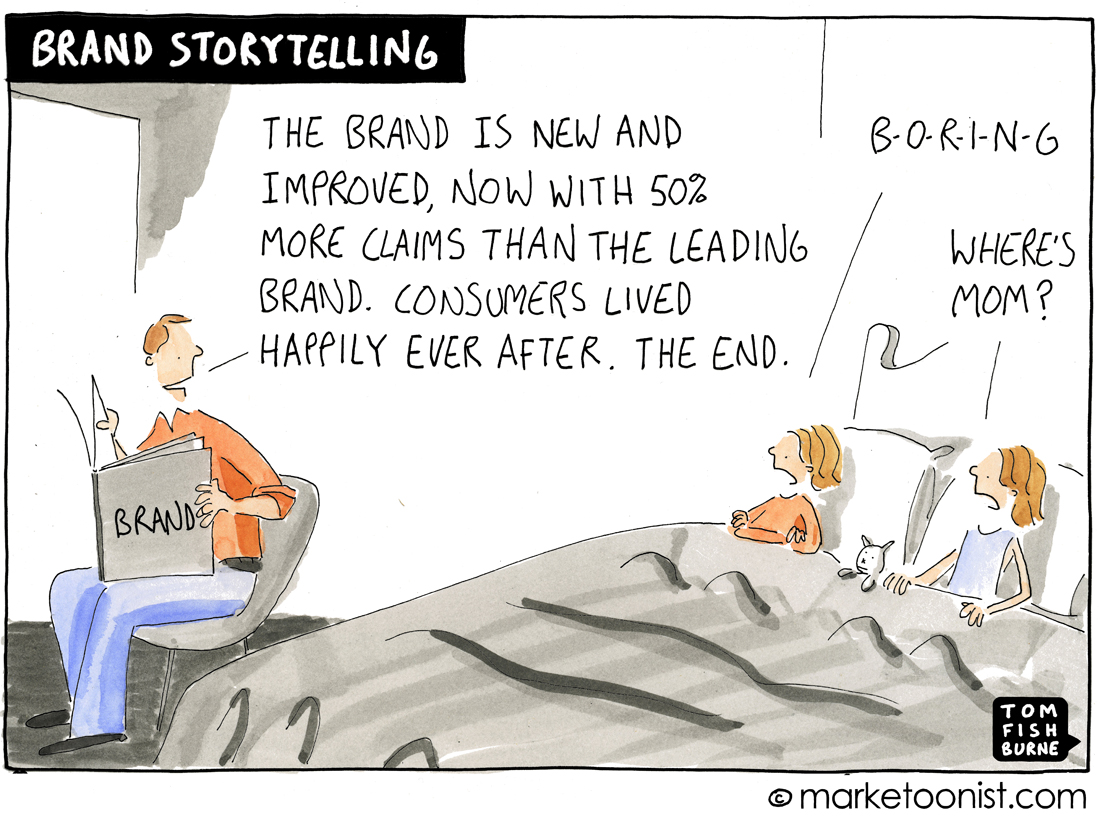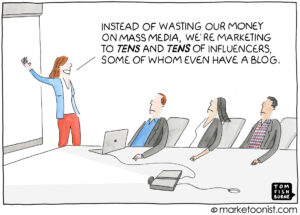It’s in vogue for marketers to think of themselves as storytellers. But much of the marketing that gets passed off as “storytelling” really isn’t that much of a story.
There is genuine power in stories and there are inspiring examples of brands that tell stories. But I think that often gets diluted by all of the content produced in the name of storytelling that is really just a thinly veiled marketing pitch.
Not all marketing is storytelling. Not all content tells a story. Most case studies are just case studies. Most video testimonials are just video testimonials. Most long-form blog posts are just long-form blog posts.
I enjoyed this 2-minute critique from Stefan Sagmeister about storytelling (from an interview ironically made while speaking at a marketing conference on storytelling).
As he summarized, “Storytelling has taken on the mantle of bullshit.”
Stories have a protagonist, conflict, and a beginning, middle, and an end. But that’s just the mechanics.
Ultimately, the only arbiter of what makes a good story is the audience. And whether the stories are so interesting that the audience passes them on to others.
I’d love to hear your thoughts on storytelling in marketing.
Here’s a related cartoon from 2011.



Scott says
And it has spread beyond marketing. My multi-billion dollar insurance company went through a phase where, on multi-department meetings, each manager would not just present their results, they would say “I’ve got a great story to tell about the 3rd quarter underwriting retention rates in California.” And the “story” would be some micro-improvement in a pointless metric.
The hero of the story, of course, was the manager.
Suprisingly, no one ever said “I have a bad story to tell. Results sucked.” Those results were just glossed over with blame-diffusing explanations, leaving the hero unblemished to continue his triumphant journey during the 4th quarter.
Steve Schildwachter says
Excellent and timely post, Tom; this past week we were explaining to our franchisee marketing committee the buzzword “omnichannel storytelling”. A couple of thoughts for you.
It’s almost a cliche, but very true and worth repeating, that authenticity is the most important thing in marketing these days. Nowhere is that more true than in (so-called) storytelling.
In healthcare, authentic storytelling is a double-edged sword of Damocles because our subject matter is an intensely personal, life or death matter. Getting it wrong would be worse than a low Klout score or Yelp rating.
What’s working for our team is to be as person-centered in marketing as our nurses and caregivers are in day-to-day service. Decades ago, Fairfax Cone said good advertising should be written always as one person to another, which we think applies to the consumer conversations we have today.
Stephen says
I get it, but it seems to me the things that’s “in the air” is the self-righteousness necessary to set oneself up as the critic and ultimate arbiter of other people’s work. If a roller coaster designer considers part of his work to be telling a story through his design of the coaster, so what? Maybe that’s a genuine component of the final project. Why belittle that? Is Mr. Sagmeister so unoccupied as a designer himself that he has time, energy and the desire to sit for a professionally produced video just to rant about what everyone else is doing?
Amanda Kamin says
Preach on Stefan Sagmeister! Thank goodness someone finally said it!
Lu says
I’ve been having this frustration for years at my place of work. We post “Success Story” videos of our clients, but they aren’t stories at all, but testimonials, often converging on the exact same points and exact same wording. This probably has to do with asking the exact same questions in every interview. It kills me a little inside every time we post one.
I’ve recently tried to steer our team into actually collecting stories, but the problem is this takes time, effort, and planning, none of which most of the Marketing team is interested in taking. (The idea of spending more time in pre-production to get a much much more effective and impactful video seems completely wacko to them.)
We’ve never had the mechanics of a story, let alone a good one, down. I’ve drawn a map and guide for them to approach the next potential interviewee, so hopefully that helps. Still, I’m very ambivalent about calling these video testimonials “Success Stories” — even when there’s a struggle, beginning, middle, and end — when so often, we can’t get the client to give us any real conclusions to their stories, other than that everything ‘feels’ better overall.
Tami Demayo says
Since no one is the sole arbiter of the English language (or any other), who is to say that a testimonial article with a challenge, solution, and benefit can’t be called a story? Like much else in marketing, if the term “story” evokes something grander than “testimonial,” and it serves the purpose of attracting more leads, so be it. When the glamour of storytelling has faded, we will resort to another embellishment.
Still, after 26 years, our agency tagline still says “marketing communications.” And we’re not ashamed of it.
El Mariachi says
I feel the same way about marketing as Stefan feels about storytellers! So many employees at blue chip companies think they are marketing, graphic design or creative gurus, just because they have have a favourite TV advertising campaign!
Christopher says
Storytelling is what your agency says it can do better than your own marketing team so you’d better not think of taking the work in-house.